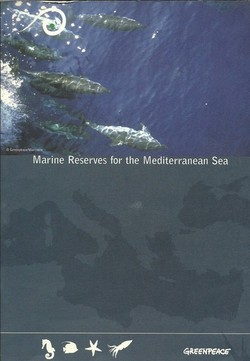
Marine Reserves for the Mediterranean Sea
Defending our Mediterranean
Introduction:-
The Mediterranean Sea – literally, the sea at the middle of the earth – has, unsurprisingly, dominated the culture of the nations that border it. Connecting three continents – Europe, Asia and Africa, the Mediterranean's resources are shared between 21 bordering countries. For thousands of years, it has facilitated trade and exchange of cultures between the various peoples of the region.
Although it is part of the Atlantic Ocean, the Mediterranean is almost completely separated from the main body of the Atlantic at the Straits of Gibraltar, at the narrowest point by only 13 kilometers of water. About 5.9 million years ago, the precursors to the modern Straits of Gibraltar closed, isolating the Mediterranean, which evaporated to a deep, dry basin some two miles below world ocean levels, containing a series of highly saline lakes. This basin permanently reflooded about 5.4 million years ago as the Straits reopened.
As a result of the separation of the Atlantic and Mediterranean Basins, the Mediterranean Sea contains many species that are found nowhere else – more than one in four species in unique to the Mediterranean. It is warmer, saltier and lower in nutrients than the Atlantic Ocean and as a result it has low primary productivity – particularly in the Eastern basin – making the Mediterranean Sea vulnerable to over-exploitation.
Nevertheless, the Mediterranean Sea has a high level of biological diversity, and the costal shelf below the 46.000 Kilometers of contains some rich and important habitats. The sea grass meadows, rocky intertidal zones and estuaries of the Mediterranean coastal zone are particularly important habitats for many species, providing spawning and nursery areas for some of the main fish species. Although the average depth is around 1.500 meters, the deepest water in the Mediterranean reaches 5.267 meters in the Calypso Deep in the Ionian Sea. These deep water areas are largely unexplored. They contain seamounts, cold seeps (where methane gases seep from the seabed) and submarine trenches – features associated with highly specialized and vulnerable ecosystems.
However the close proximity of the many millions of people who live along or visit the Mediterranean coast across three continents and the consequent heavy use of the Mediterranean Sea has placed huge pressure on the marine environment. Driftnets are still used in the Mediterranean although banned by both regional and European unionA legislation due to the high levels of by-catch (unwanted species caught by fishing gear) that results from their use. Bottom trawling, arguably the most destructive of all fishing methods, has been banned in the Mediterranean at depths below 1000 meters. However trawling, equivalent to the clear-felling of forest continues in shallower waters.
Added to the damage caused by capture fisheries, aquaculture activities exert heavy toll on the marine environment. On a local level, the use of chemicals and the location of highly stocked enclosures often cause much damage. More widely, aquaculture creates huge a demand for feed derived from marine species. Far from being a solution to overfishing stocks, aquaculture can actually encourage overfishing on the species used to manufacture feed.
The Mediterranean Sea is also polluted on daily basis by sewage and chemical discharges from land. These problems are increasing in magnitude as a result of poorly regulated coastal development. Shipping activites are associated with polluting oil inputs.
In short, the "sea between us" is being damaged by all but protected by none.
Contents
- Values of the Mediterranean
- Threats to the Mediterranean
- Marine reserves
- The Mediterranean – a special political seascape
*** For more please visit the library***



ساحة النقاش